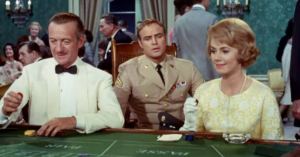When one thinks of Marlon Brando, images of the intense, brooding performances in The Godfather, A Streetcar Named Desire, and Apocalypse Now often come to mind. Renowned for his method acting, volatile temperament, and complex personality, Brando was famously known for his disdain of Hollywood and its machinery. He often clashed with directors, refused to memorize lines, and rarely enjoyed the process of filmmaking. But what many don’t know is that there was one film set where the legendary actor actually had a good time—The Freshman (1990), a forgotten comedy gem that brought out a lighter, more joyful side of Brando rarely seen on screen or behind it.

Directed by Andrew Bergman, The Freshman is a comedy that playfully satirizes the very image that made Brando iconic. In a daring move, the actor plays Carmine Sabatini, a character suspiciously similar to Don Vito Corleone from The Godfather. The film stars a young Matthew Broderick as Clark Kellogg, a film student who gets pulled into a bizarre and hilarious world of exotic animals, shady business deals, and mafia-like intrigue—all under the mentorship of Brando’s character.
Brando’s willingness to parody his most famous role was surprising in itself. But what shocked those around him even more was how much he enjoyed working on the movie. On a set where tension might have been expected—given Brando’s reputation for being difficult—there was instead laughter, playfulness, and mutual respect. It was the rare moment in his later career when Brando seemed to let go of the weight of his cinematic legacy and simply have fun.
Director Andrew Bergman revealed in interviews that Brando was in high spirits throughout the shoot, often cracking jokes and improvising scenes with Broderick. The two actors reportedly got along extremely well, with Brando appreciating Broderick’s quiet charm and comedic timing. The environment on set was relaxed, collaborative, and free of the ego clashes that had plagued Brando’s previous productions. For once, he wasn’t at war with the script or the director—he was embracing the absurdity of the material.
The Freshman also allowed Brando to engage with a different side of his talent—his comedic instincts. While he was best known for intense drama, those close to him often described Brando as having a sharp, mischievous sense of humor. In this film, that humor came to the forefront. His delivery, timing, and self-aware performance showed that the master of drama could also deliver in comedy, especially when poking fun at his own legend.
Critics at the time praised the film’s clever writing and Brando’s performance, though The Freshman never achieved blockbuster success. It was modest at the box office and has since faded into relative obscurity. However, among cinephiles and Brando aficionados, the film is considered a hidden treasure—a charming, offbeat comedy that offers a rare glimpse of a lighter Brando, one who could laugh at himself and delight in the craft of acting without burden.
In many ways, The Freshman is more than just a comedy—it’s a reflection of Brando at peace with his mythos. After decades of struggling with fame, creative frustration, and the pressures of being considered one of the greatest actors of all time, Brando found joy in a role that allowed him to parody himself with grace and humor. It’s a poignant reminder that even icons can surprise us, and that behind every tortured genius, there might just be a comic waiting for the right script to let loose.
As we revisit Marlon Brando’s towering legacy, The Freshman deserves a second look—not just for its sharp wit and clever storytelling, but for showcasing the only film set that Marlon Brando, by his own admission, truly enjoyed. In a career marked by brilliance and turbulence, this comedy stands out as a rare moment of lightness, laughter, and joy.